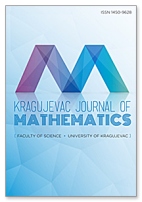Existence of Solutions for Inhomogeneous Biharmonic Problem Involving Critical Hardy-Sobolev Exponents
 Download PDF
Download PDF
Authors: A. BENNOUR, S. MESSIRDI AND A. MATALLAH
DOI: 10.46793/KgJMat2601.151B
Abstract:
This paper is devoted to the study of biharmonic problems. More precisely, we consider the following inhomogeneous problem
 |
where Ω is a bounded domain in ℝN and N ≥ 5, under sufficient conditions on the data and the considered parameters, we prove the existence and multiplicity of solutions, by virtue of Ekeland’s Variational Principle and the Mountain Pass Lemma.
Keywords:
Palais-Smale condition, Ekeland’s variational principle, critical Hardy-Sobolev exponent, singularity, biharmonic problem.
References:
[1] A. Ambrosetti and P. H. Rabinowitz, Dual variational methods in critical point theory and applications, J. Funct. Anal. 14 (1973), 305–387. https://doi.org/10.1016/0022-1236(73)90051-7
[2] L. Ambrosio and E. Jannelli, Nonlinear critical problems for the biharmonic operator with Hardy potential, Calc. Var. Partial Differential Equations 54 (2015), 365–396. https://doi.org/10.1007/s00526-014-0789-7
[3] H. Brezis and L. Nirenberg, A minimization problem with critical exponent and non zero data, Symmetry in Nature (A volume in honor of L. Radicati), Scuola Normale Superiore Pisa I (1989), 129–140.
[4] H. Brezis and T. Kato, Remarks on the Schrodinger operator with singular complex potential, J. Math. Pure Appl. 58 (1979), 137–151.
[5] Y. Deng and S. Wang, On inhomogeneous biharmonic equations involving critical exponents, Proc. Roy. Soc. Edinburgh Sect. A 129 (1999), 925–946. https://doi.org/10.1017/S0308210500031012
[6] I. Ekeland, On the variational principle, J. Math. Anal. Appl. 17 (1974), 324–353. https://doi.org/10.1016/0022-247X(74)90025-0
[7] D. Kang and L. Xu, Asymptotic behavior and existence results for the biharmonic problems involving Rellich potentials, J. Math. Anal. Appl. 455 (2017), 1365–1382. https://doi.org/10.1016/j.jmaa.2017.06.045
[8] F. Rellich, Perturbation Theory of Eigenvalue Problems, Courant Institute of Mathematical Sciences, New York University, New York, 1954.
